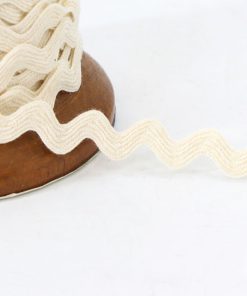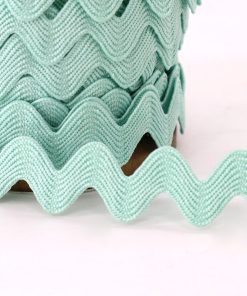Two Thread Embroidery Attachment, Singer (Vintage Original) The Singer Featherweight Shop
$ 1.895,00 $ 473,75
There are many, many photos above, be sure to click on each one for further detail.
This is a very, very scarce attachment to find indeed and we know this attachment is expensive. That’s because it is quite a collector’s item not just because of how scarce it is to find one, but also because of how difficult it is to find one that is working and functional! This attachment, however, has been tested and sampled to be sure it is a working attachment and comes with original instructions. The original box is included with this attachment.
Be sure to watch the video, under the video tab, on how to use this attachment.
It is imperative that each upper and lower clamp grip precisely over the thread crossing arms like you see in the photographs above.
The Two-Thread Embroidery Attachment varied in color over the years. Sometimes they would be chromium and sometimes they would have a Blackside finish. This particular one has the chromium finish and is complete with a beautiful box and original instructions.
You can see in the antique baby garment how a similar effect was accomplished with the thread weaving in and out forming a wave-like effect.
As you can see in all the samples above that you can use the standard thumb screw, however, it does make it easier (the thread is less likely to get caught) if you have the original teeny tiny thumb screw that would have been included originally with the attachment. It is so tiny that they were not thought to be a thumb screw when tossed into a sewing cabinet drawer. Who knows how many of them have been tossed over the years. Be sure to watch the video above to see what the original thumb screw looks like.
The best thread that I have found to work with is Sulky 12wt thread. It’s a bit thicker than normal thread, but still lightweight enough that the threads actually criss-cross to achieve the decorative effect the Two Thread Embroidery Attachment is so famous for. However, you will have much enjoyment experimenting with all different thread types and styles.
Practice makes perfect! Be sure to use a stabilizer with your fabric, just like all machine embroidery work. After reading through the instructions and working very, very slowly, be sure to start out by practicing with straight lines. As you gain more confidence, use a traced design and work with curves and points.
Or, simply put this on display in your pretty oak curio cabinet and you will definitely have a conversation piece for your attachment collection — very strange in appearance, wouldn’t you say? It kind of looks like a preying mantis.
Fast Shipping & Professional Packing
We have a range of shipping options due to our long-term partnership with UPS FedEx DHL. Our warehouse personnel will pack every item to our exacting specifications. Prior to shipping your items will be thoroughly examined and secured. Each day, we ship to thousands of clients in many countries. This demonstrates our dedication to become the biggest online retailer on earth. There are distribution centers and warehouses located in Europe and the USA.
Note: Orders that include more than one item are assigned a processing time depending on the item.
We will carefully examine all items ordered before shipping. Today, the majority of orders will be shipped within 48 hours. Delivery time ranges between 3-7 days.
Returns
Stock is dynamic, and cannot be fully controlled by us because of the involvement of many entities, including the factory as well as our warehouse. This means that the actual stock could alter at any time. It's possible that you may not receive your order once the order has been made.
Our policy runs for 30 days. If you have passed 30 days without a trace since the purchase however, we're unable to give you a refund or exchange.
In order to be eligible for a refund your product must be unopened and in the same condition as when you received it. It must also be returned in its original packaging.
Related products
Ribbons & Trim
1/4″ Inch COTTAGE VINTAGE TRIM RIC RAC by Lori Holt (by the yard) The Singer Featherweight Shop
Vintage Advertisements
Advertisements, Rare Singer ITALIAN – (Vintage Original) The Singer Featherweight Shop
Ribbons & Trim
1/4″ Inch RILEY RED VINTAGE TRIM RIC RAC by Lori Holt (by the yard) The Singer Featherweight Shop
Vintage Advertisements
Sewing Machine Replacement Parts
Amoeba Feed Cover Plate, Singer (Vintage Original) The Singer Featherweight Shop
Ribbons & Trim
1/4″ Inch STEEL VINTAGE TRIM RIC RAC by Lori Holt (by the yard) The Singer Featherweight Shop
Craft Measuring & Marking Tools
Alphabitties EXPANSION PACK- Alphabet & Number Tags by It’s Sew Emma The Singer Featherweight Shop
Ribbons & Trim
1/4″ Inch SONGBIRD VINTAGE TRIM RIC RAC by Lori Holt (by the yard) The Singer Featherweight Shop
Ribbons & Trim
1/4″ Inch NUTMEG VINTAGE TRIM RIC RAC by Lori Holt (by the yard) The Singer Featherweight Shop
Ribbons & Trim
1/4″ Inch CLOUD VINTAGE TRIM RIC RAC by Lori Holt (by the yard) The Singer Featherweight Shop
Ribbons & Trim
1/4″ Inch RILEY AQUA VINTAGE TRIM RIC RAC by Lori Holt (by the yard) The Singer Featherweight Shop
Ribbons & Trim
3/8″ Inch IVORY Cotton RIC RAC from France (sold by the yard) The Singer Featherweight Shop
Ribbons & Trim
1/4″ Inch RILEY GREEN VINTAGE TRIM RIC RAC by Lori Holt (by the yard) The Singer Featherweight Shop
Ribbons & Trim
1/4″ Inch PEBBLE VINTAGE TRIM RIC RAC by Lori Holt (by the yard) The Singer Featherweight Shop
Ribbons & Trim
5/8″ Inch STEEL VINTAGE TRIM Large RIC RAC by Lori Holt (by the yard) The Singer Featherweight Shop
Ribbons & Trim
1 1/2″ Inch JUMBO RIC RAC by Riley Blake – CREAM (sold by the yard) The Singer Featherweight Shop
Ribbons & Trim
1/4″ Inch DENIM VINTAGE TRIM RIC RAC by Lori Holt (by the yard) The Singer Featherweight Shop




















































































